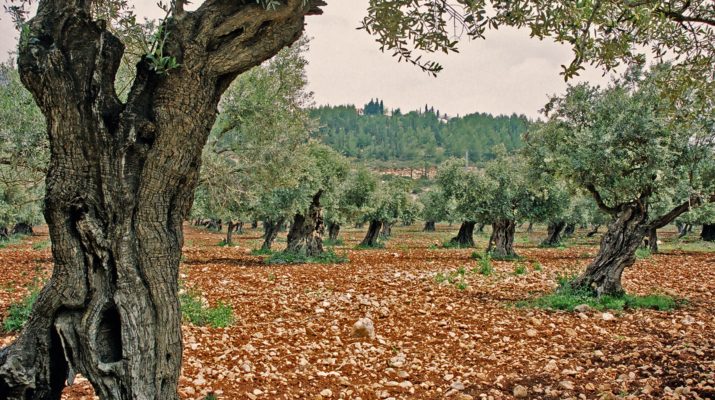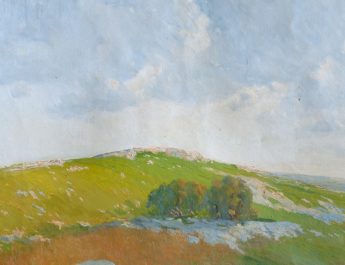Psalm 40:1-5
Narrative Lectionary 425
To the leader.I Of David.II A Psalm.III
I “leader” = natsach. Properly, something that glitters from a distance. So, something that stands out, excels, has status/standing (such as a chief musician or superintendent of Temple services). This can also mean to be permanent or enduring.
II “David” = David. From the same as dod (beloved, love, uncle); the root may mean to boil, which is used figuratively to describe love. So, this implies someone you love such as a friend, a lover, or a close family member like an uncle. David’s name likely means something like “beloved one.”
III “Psalm” = mizmor. From zamar (making music; used specially of music to worship God; music with singing, singing praise, singing psalms); may be from zamar (to trim or prune). This is a melody or a psalm.
1 I waited patiently forIV the Lord;V
he inclinedVI to me and heardVII my cry.VIII
IV “waited patiently for” = qavah + qavah. It can mean to bind or gather together, especially in the sense of twisting together. In that light, it can mean collect. Figuratively, this can mean to wait, await, expect, or tarry. The word is repeated twice – the first time as an Infinitive Absolute. The Infinitive Absolute serves to emphasize the sentiment of the word. It is rather like Foghorn Leghorn’s speech pattern, “I said, I said.”
V “Lord” = YHVH. From havah (to be, become) or hayah (to come to pass, become, be). This is the name of the God of Israel, the self-existent and eternal one, the tetragrammaton. This pronunciation has been lost to time so “Lord” is generally used in its place.
VI “inclined” = natah. This is to stretch or spread out, to extend, or bend. In can also imply moral deflection.
VII “heard” = shama. This is to hear, call, consent, or consider. It implies listening intelligently, giving attention, and, because of these two factors, obedience and action are often implied.
VIII “cry” = shavah. 11x in OT. From shava (crying or shouting aloud; seeking freedom from some kind of trouble). This is cry, cry for help.
2 He drew me upIX from the desolateX pit,XI
out of the miryXII bog,XIII
IX “drew…up” = alah. This is to go up, approach, ascend, be high, be a priority; to arise in a literal or figurative sense.
X “desolate” = shaon. 18x in OT. From shaah (to crash, rumble, rush, be desolate, devastate). This is a crash, loud sound, clamor, rumbling, destruction. It could also be the sound of rushing water.
XI “pit” = bor. From bur (to bore; figuratively, to explain, examine, or clear up). This is a pit – generally a cistern or dungeon. It could also be a well or fountain.
XII “miry” = yaven. 2x in OT. Perhaps from the same as yayin (wine; root means to effervesce). This is mire or miry, mud. It can also refer to dregs.
XIII “bog” = tit. 13x in OT. Root perhaps means being sticky. This is mud, clay, or mire. Figuratively, it can refer to calamity.
and setXIV my feetXV upon a rock,XVI
making my stepsXVII secure.XVIII
XIV “set” = qum. To arise, stand, accomplish, establish, abide. This is rising as in rising against, getting up after being sick or asleep, arising from one state to another, becoming powerful, or rising for action. It can also be standing in a figurative sense.
XV “feet” = regel. This is foot, endurance, or journey. It is a foot as the means of walking and so it implies a step or a greater journey. It can be used euphemistically for private parts.
XVI “rock” = sela. Root may mean being lofty. This is a rock, cliff, crag, mountain. It could be used figuratively for obstinance or to show God as a refuge. It can also more generally mean fortress or stronghold.
XVII “steps” = ashshur. 9x in OT– 2x in Job, 6x in Psalms, 1x in Proverbs. From ashar (to go straight, lead, guide; to be level and so to be right, blessed, honest, happy). This is step or going.
XVIII “making…secure” = kun. Properly, this means in a perpendicular position. So, it is set up in a literal sense – establish, fix, fasten, prepare. In a figurative sense, it is certainty, to be firm, faithfulness, render sure or prosperous.
3 He putXIX a newXX song in my mouth,XXI
a song of praiseXXII to our God.XXIII
XIX “put” = natan. This is to give, put, set, offer. It is to give literally or figuratively.
XX “new” = chadash. From chadash (to renew or restore, to repair or rebuild). This is something fresh or new.
XXI “mouth” = peh. This is mouth in a literal or figurative sense. So, more literally, it can be beak or jaws. More figuratively, it refers to speech, commands, or promises.
XXII “praise” = tehillah. From halal (to praise, be boastful). This is praise or a song of praise. It is to offer God a hymn, to boast in God. This shares a root with “hallelujah.”
XXIII “God” = Elohim.
Many will seeXXIV and fear,XXV
and put their trustXXVI in the Lord.
XXIV “see” = raah. This is to see in a literal or figurative sense so stare, advise, think, view.
XXV “fear” = yare. This is to fear, be afraid, dreadful. It can also refer to fearful reverence – to fear in a moral sense is to say to revere, respect.
XXVI “put…trust” = batach. This is to hide for refuge, be secure or sure. Figuratively, it refers to trust, being confident, or hoping.
4 HappyXXVII are thoseXXVIII who makeXXIX
the Lord their trust,XXX
XXVII “happy” = esher. Related to “steps” in v2. From ashar (see note XVII above). This is happy or blessedness.
XXVIII “those” = geber. From gabar (to be strong or mighty; to prevail or to be insolent) This is man, warrior, a person generally, or a valiant person.
XXIX “make” = sim. This is to put or place in a literal or figurative sense. It can be appoint, care, change, make, and may other things.
XXX “trust” = mibtach. Related to “put…trust” in v3. 15x in OT. From batach (see note XXVI above). This is confidence, trust, hope, refuge, security, assurance.
who do not turnXXXI to the proud,XXXII
to those who go astrayXXXIII after false gods.XXXIV
XXXI “turn” = panah. This is to turn, regard, appear, look, prepare.
XXXII “proud” = rahab. 1x in OT. From rahab (to act arrogantly, storm, be proud, strengthen, embolden, capture, confuse). This is proud or defiant.
XXXIII “go astray” = sut. 2x in OT. This is to fall away, lapse, turn to the wrong practice. So, it is used for acts of idolatry.
XXXIV “false gods” = kazab. From kazab (to lie, be false or in vain, to fail; to deceive in a literal or figurative sense). This is a lie or deception. It can also be used figuratively to refer to an idol.
5 You have multiplied, O Lord my God,
your wondrous deedsXXXV and your thoughtsXXXVI toward us;
none can compareXXXVII with you.
XXXV “wondrous deeds” = pala. From pele (wonder, miracle, wonderful, marvelous thing). This is to be extraordinary, to arise, to be great or accomplish.
XXXVI “thoughts” = machashabah. From chashab (literally to weave; figuratively to think or plot something malicious). This is thought, scheme, imagination, purpose, or a plan either good or evil.
XXXVII “compare” = arak. This is to arrange by setting in a row. It can also mean to set a battle, estimate, put in order, or compare.
Were I to proclaimXXXVIII and tellXXXIX of them,
they would be moreXL than can be counted.XLI
XXXVIII “proclaim” = nagad. This is to declare, make conspicuous, stand in front, manifest, predict, explain.
XXXIX “tell” = dabar. This is generally to speak, answer, declare, or command. It might mean to arrange and so to speak in a figurative sense as arranging words.
XL “be more” = atsam. This is vast, numerous, strong. It can be to close one’s eyes, to make powerful, or to break bones.
XLI “counted” = saphar. From sepher (writing, document, book, evidence). This is properly to tally or record something. It can be enumerate, recount, number, celebrate, or declare.
Image credit: “Olive Trees” in Galil, Israel by chany crystal, 2006.




